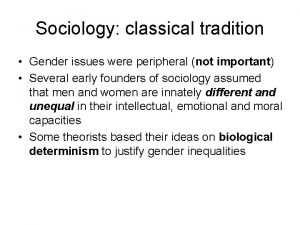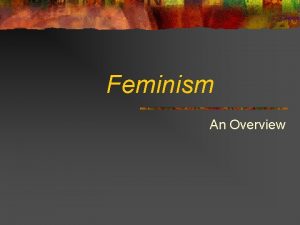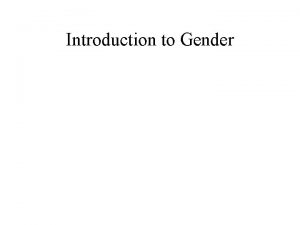MESLEK NGLZCE II KISIM 6 FEMINISM Feminism is










- Slides: 10

MESLEKİ İNGİLİZCE II KISIM 6

FEMINISM • Feminism is a range of political movements, ideologies, and social movements that share a common goal: to define, establish, and achieve the political, economic, personal, and social equality of the genders. This includes fighting gender stereotypes and seeking to establish educational and professional opportunities for women that are equal to those for men.

Feminist movements • Feminist movements have campaigned and continue to campaign for women's rights, including the right to vote, to hold public office, to work, to earn fair wages or equal pay, to own property, to receive education, to enter contracts, to have equal rights within marriage, and to have maternity leave. Feminists have also worked to ensure access to legal abortions and social integration, and to protect women and girls from rape, sexual harassment, and domestic violence. Changes in dress and acceptable physical activity have often been part of feminist movements

gender neutrality • Some scholars consider feminist campaigns to be a main force behind major historical societal changes for women's rights, particularly in the West, where they are near-universally credited with achieving women's suffrage, gender neutrality in English, reproductive rights for women (including access to contraceptives and abortion), and the right to enter into contracts and own property.

feminist advocacy • Although feminist advocacy is, and has been, mainly focused on women's rights, some feminists, including bell hooks, argue for the inclusion of men's liberation within its aims because they believe that men are also harmed by traditional gender roles. Feminist theory, which emerged from feminist movements, aims to understand the nature of gender inequality by examining women's social roles and lived experience; it has developed theories in a variety of disciplines in order to respond to issues concerning gender.

feminist movements • Numerous feminist movements and ideologies have developed over the years and represent different viewpoints and aims. Some forms of feminism have been criticized for taking into account only white, middle class, and college-educated perspectives. This criticism led to the creation of ethnically specific or multicultural forms of feminism, including black feminism and intersectional feminism.

feminist movements • The feminist movement (also known as the women's movement, or simply feminism) refers to a series of political campaigns for reforms on issues such as reproductive rights, domestic violence, maternity leave, equal pay, women's suffrage, sexual harassment, and sexual violence, all of which fall under the label of feminism and the feminist movement. The movement's priorities vary among nations and communities, and range from opposition to female genital mutilation in one country, to opposition to the glass ceiling in another.

Feminism • Feminism in parts of the western world has gone through three waves. First-wave feminism was oriented around the station of middle- or upper-class white women and involved suffrage and political equality. Second-wave feminism attempted to further combat social and cultural inequalities.

Feminism • Although the first wave of feminism involved mainly middle class white women, the second wave brought in women of color and women from other developing nations that were seeking solidarity. Third-wave feminism is continuing to address the financial, social and cultural inequalities and includes renewed campaigning for greater influence of women in politics and media. In reaction to political activism, feminists have also had to maintain focus on women's reproductive rights, such as the right to abortion.

Feminism • Feminism in China started in the 20 th century with the Chinese Revolution in 1911. In China, Feminism has a strong association with socialism and class issues. Some commentators believe that this close association is damaging to Chinese feminism and argue that the interests of party are placed before those of women.



















